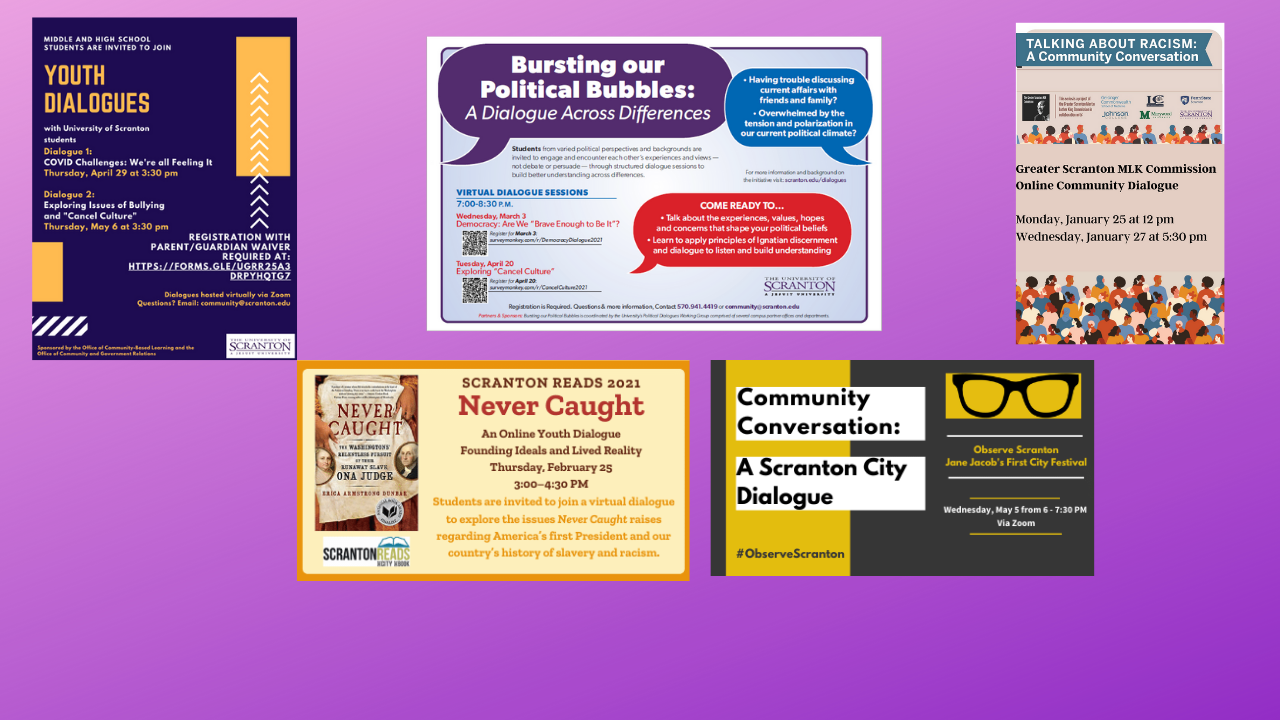University Continues Dialogue Initiative with a Variety of Events this Spring

This spring The University of Scranton offered several structured dialogues to a variety of participants as a part of its ongoing Dialogue initiative. The goal of these structured dialogues is to provide participants with a space to engage and encounter each other's experiences and views -- not debate or persuade -- to build understanding. This spring the University offered two nonpartisan student political dialogues, community dialogues and youth dialogues.
Campus Political Dialogues
In March and April, the University’s Political Dialogues Working Group offered two virtual student political dialogues on two current issues: what it takes to sustain democracy and exploring “cancel culture.” A total of 107 University of Scranton students attended. The first political dialogue, Democracy: Are We “Brave Enough to Be It”?, took place on Wednesday, March 3, and was inspired by National Youth Poet Laureate Amanda Gorman’s inauguration poem “The Hill We Climb”. The second political dialogue, Exploring “Cancel Culture,” took place on Tuesday, April 20, and offered an opportunity for students to discuss the phenomenon of cancel culture and its impact on both society and individuals.
Scranton City Dialogue
On the evening of May 5 Scranton community members joined for a special community dialogue event, Community Conversation: A Scranton City Dialogue. This Jane Jacobs inspired community conversation focused on questions and themes raised by Jacobs in a seminal 1987 letter to the City about “what Scranton is, has been, and can be.” Over 30 participants joined via Zoom for a structured dialogue to share what they love about Scranton and to identify ways that we can work to address Scranton’s most pressing challenges. This community dialogue was sponsored by The University of Scranton and The Center for the Living City in partnership with United Neighborhood Centers of NEPA, NeighborWorks of NEPA, Scranton Tomorrow, Valley in Motion, the Greater Scranton MLK Commission, and the Scranton Area Ministerium.
Dialogues on Topics of Race and Black History
In January, the University also partnered with the Greater Scranton MLK Commission to offer two community dialogue events. These community conversations were offered as a follow up to the MLK Commission’s MLK Day event featuring Dr. John Amechi, OBE and provided participants with an opportunity to expand upon the ideas shared by Dr. Amechi and to connect with others within their home communities to discuss how to build a more inclusive and equitable community. A total of 46 community members attended.
Several youth dialogues were also offered this spring. On Feb. 3, middle and high school students came together for a dialogue focused on this year’s Scranton Reads Book Never Caught: The Story of the Washingtons’ Relentless Pursuit of Their Runaway Slave, Ona Judge, by Dr. Erica Armstrong Dunbar. Students joined to discuss Dunbar’s book and to reflect on our nation’s founding ideals and the lived reality of slavery and racism.
Youth Dialogues as Part of a Community-Based Learning Course
Two additional youth dialogues were held as a part of a community-based learning course, Family Issues and Social Policy, offered by sociology professor Dr. Loreen Wolfer. Dr. Wolfer’s students prepared for these dialogues by participating in campus dialogues, attending facilitator training, and crafting their own original dialogue questions. For these dialogues, students from community-partner United Neighborhood Centers of NEPA “Leader’s In Training” (LIT) program joined with University student facilitators for two structured dialogue sessions focused on current affairs. The first dialogue, “Covid Challenges: We’re All Feeling It” took place on April 29 and examined the impact, both positive and negative, that this past year has had on relationships, school, and social relationships. The second dialogue, “Exploring Issues of Bullying and Cancel Culture,” took place on May 6 and offered LIT students an opportunity to discuss their own experiences and also to listen to learn from the experiences of others when it comes to bullying and “cancel culture.”
“There are many challenges of doing social science-related, community-based learning during a pandemic. The Structured Dialogues between my Family Issues and Social Policy students, the UNC Youth program, and the Office of Community Based Learning created a unique opportunity for my students to relate some of the issues covered in the class to the perspectives of local high school students in a way that my students found to be informative and personally rewarding. In fact, my students enjoyed connecting with the area high schoolers so much that I am going to look for pedagogical ways to incorporate this as a consistent option for CBL in this class,” said Dr. Wolfer.
The University has organized similar structured discussions on campus since 2017 as part of an ongoing dialogue initiative. (scranton.edu/alumni/journal/issues/2018/fall/features/political-bubble.shtml). Questions about the virtual political and community dialogues can be directed to community@scranton.edu.






